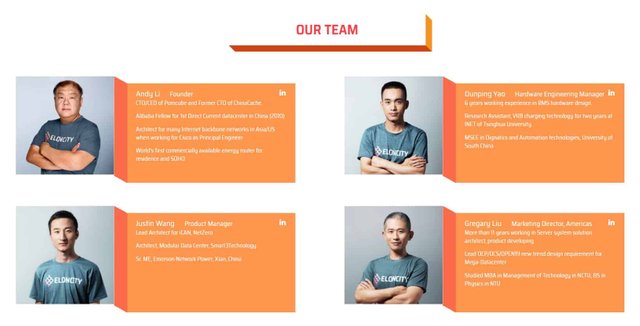Eloncity DCbus System and token sale

Eloncity is the blockchain network as it is decentralized powering the infrastructure for a number of self-sufficient local products. This will have the availability got a direct competitive utility ensuring 24/7 energy sufficiency. People will be using Eloncity open technologies for making the electricity virtually free to electrify the world with clean energy.
The system of Eloncity comprises with the utility tokens protocols as ECTP suites the protocol governing the electricity in exchange to the endpoints where most critical process of protocols induces, such as; the protocol will be used between the endpoints and the blockchain energy exchange platform, the TLVs will define the Scheduler and the endpoints and the DCbus will send and receive the endpoints for the energy.
DCbus Scheduling
The foundational building of DCbus will build the blocks of Eloncity through the microgrids with the endpoints for the customer premise. The endpoints will integrate the high-capacity of BESS energy transaction Scheduler and DC stepping down and stepping up so that the transformer and DC voltage will have their own level of the regulator. All the conductors have some limited number of electric current carrying capacity and the electricity traffic management scheme will use this enabling the optimal energy by the exchange over three minutes of the time interval.
The scheduling algorithm is similar to Egress Credit Scheduling along with the iSLIP Scheduling algorithm enabling the optimized amount of energy in order to pass through each of the DCbus endpoints in every three minutes. The Scheduler coordinates with multiple endpoints by the bidirectional conductor. These endpoints will receive the grants from the Scheduler in one interval ahead and this will be sending and receiving the energy at full force.
ECTP Segments
The ECTP segments will work in each hour into 3-minute, 6-minute, 15-minute, 30-minute and hour intervals. This will have the constant energy resources for the existing grid or energy storage systems and this will continue the exchange of energy without initializing the new trade in every 3 minutes. A customer will have the ability to buy electricity from the community of solar-garden at a rate of 10 kilowatts in an hour. The trade is recorded and Scheduler will find the spare capacity by the intervals for the next twenty times.
The customers will continue the endpoints drawing the 10-kilowatt electricity for an hour. The endpoint will need to resubmit the new petitions by the next 20 intervals for this recorded exchange. This scheme will reduce the transaction by the counts on the DCbus Scheduler encouraging the endpoints engaging for the longer periods of energy exchange. This will also enable a longer trade for more than an hour and it will depend on the memory resources of the Schedule. This will be done through the lesson learned from the future during the Eloncity pilot projects.
The petition process will have the affinity of “low battery” and “full battery” precedence in a high amount by the affinities including in the longer period. The longer period will trade successfully as recorded grant sent for higher petitions by the following intervals. This cannot grant the preempt petitions and the DC bus Scheduler should have the reserve for a certain capacity setting a higher priority petition for a longer period of trade and this will not hog the DCbus. So the reserved capacity might be wasted from time to time.
Team of Eloncity

Andy Lee is the founder of Eloncity. He has a technical background in computer engineering and previously worked as a technical director for POMCube and ChinaCache among other technical roles.
Michael Nguyen is the vice president of Eloncity and is responsible for developing the program. He has more than 30 years of professional experience in various industries and has 17 patents.
The main Eloncity team consists of 8 people, including Andy Lee and Michael Nguyen. The team has experience in software development, power design, cloud computing and hardware design.
The advisors of Elconity are Brian Allen, Chris Wally, Ensol Lee, Haifeng Ku, Howard Choi, Michael Yuan, Robert Fortunato, Robert Mao, Calvin Xu and Jasmine Zhang. Consultants bring in the project a lot of experience, providing their experience in other block projects and large technology corporations, as well as in business, consulting and science.
Private sale : $19,000,000
Vesting period: 9-months locking position with 10% of token discharged in the meantime as the principle token discharge (six a month and a half after the finish of the fundamental commitment). From that point, 10% token discharged every month in 9 back to back stages.
Public token sale
• ICO Token Price: 1 ECT = 0.12 USD
• Fundraising Goal: 33,000,000 USD
• Total Tokens: 1,000,000,000
• Available for Token Sale: 32%
ICO Details
• Type: ERC20 – Utility
• Symbol: ECT
• Platform: Ethereum
• Minimum Investment: 0.1 ETH
• Maximum investment in the public sale: 3 Eth
• Soft Cap: $ 10 million
• Hard Cap: $33 million
• Payments Accepted: ETH and BTC
• Restricted from Participating: USA, China, New Zealand, and anyone who is a citizen or resident in a geographic area sanctioned by the USA as well as anyone subject to USA and/or United Nations sanctions
The platform of Eloncity comprises with the reference of design for hardware and software as per the necessity to deploy an operational renewable microgrid.
Website: https://eloncity.io/
Twitter: https://twitter.com/Eloncity_io
Facebook: https://www.facebook.com/Eloncity-229599404279234/
Telegram: https://t.me/Eloncity
Krypital Bounty Group: https://t.me/KrypitalBounty
Eloncity Group: https://t.me/Eloncity
Krypital News: https://t.me/KrypitalNews
Unique identification link: http://eloncity.io/?utm_source=Content&utm_medium=Bounty&utm_campaign=B000606
Bitcointalk : https://bitcointalk.org/index.php?action=profile;u=1965150